
Despite talk of historic cooperation, the divide between Mexico City & DC is deepening
by Luis Rubio, political analyst and Chair of México Evalúa.
Mexico City and Washington are the capitals of two neighboring nations whose interactions are among the most dynamic and complex in the world — yet whose leaderships could hardly be more distant or contrasting. Both countries are about to begin negotiations to review their existing trade agreement, but their perspectives are so different that, if current trends continue, it is hard to imagine a successful outcome.
For nearly two centuries, Mexico and the United States maintained a relationship that fluctuated between closeness and distance, conflict and limited cooperation. The border evolved significantly over time—most notably through Texas’s independence and the U.S. invasion of 1847 — while the Mexican Revolution of 1910 further strained relations as Mexico sought U.S. recognition of the new revolutionary regime. The relationship was functional but tense, full of ups and downs.
In the 1980s, Mexico decided…
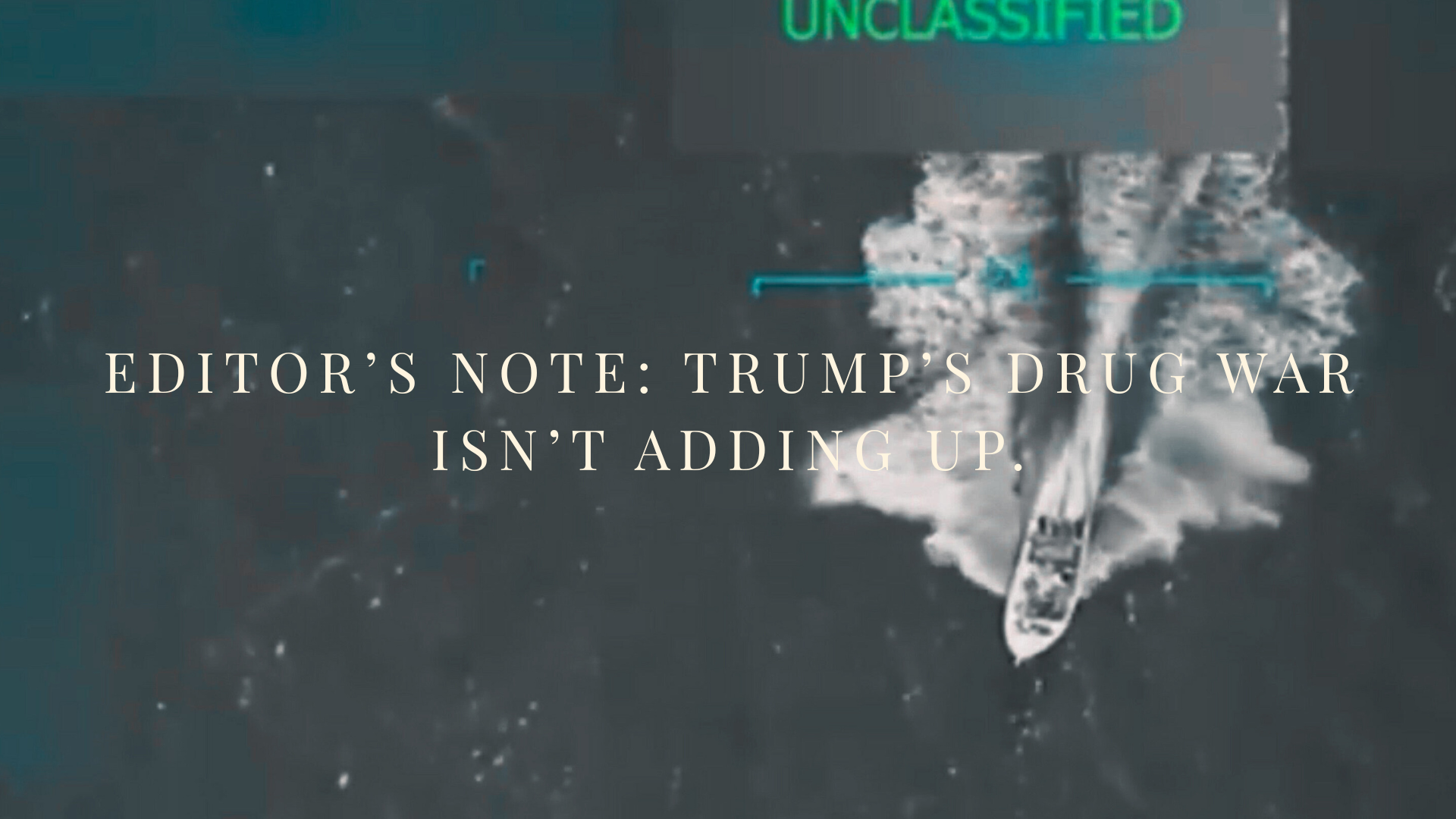
Trump’s drug war isn’t adding up
by Andrew Law, editor and founder.
I want to pause this week to point out an incongruity in the Trump administration’s supposed war on drug trafficking that is posing challenges around how we best cover this key topic. This isn’t my usual kind of column, but I hope you’ll bear with me.
The press — and I think most people generally on both sides of the border — see Trump as having gone hard on traffickers. The militarized southern border, the arm-twisting of Sheinbaum and her MORENA allies, downgrading Colombia, and of course, the bombing of passenger boats in the Caribbean. Last week, I highlighted rumors that the fuel theft scandal engulfing Mexico’s Navy (and discussed in more detail this week by Luis Rubio) is being propelled by leaks out of Washington. It all gives the impression of a major realignment of US security posture. But when you zoom in, it just doesn’t hang together…
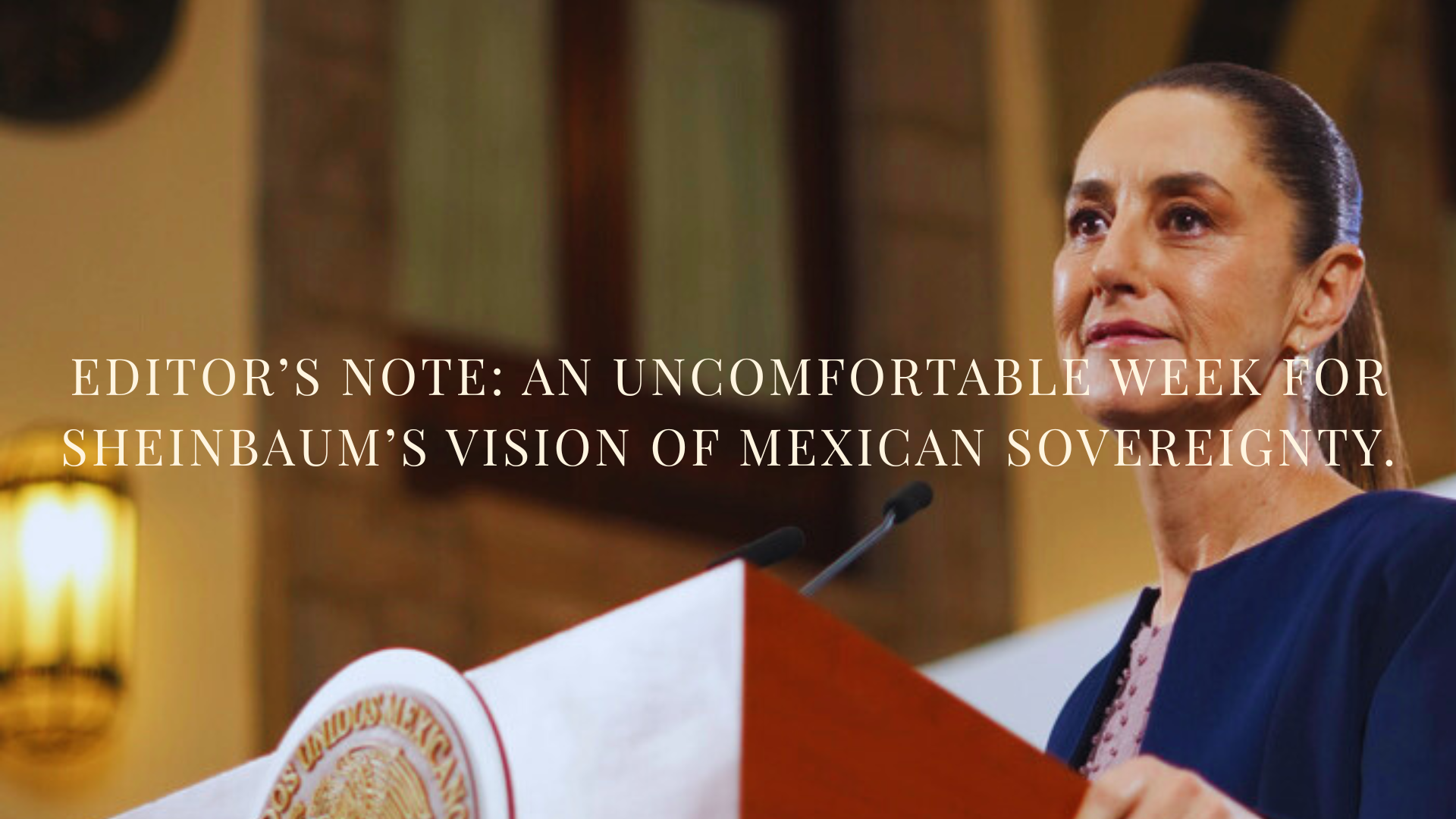
Editor’s note: An uncomfortable week for Sheinbaum’s vision of Mexican sovereignty
by Andrew Law, editor and founder.
This week a video circulated on social media of former Mexican president Felipe Calderón decrying the country’s freshly implemented judicial reform at Georgetown University in Washington, DC.
In it, Calderón called MORENA’s reform a “demolition project” that had likely rendered free elections a thing of the past. What seemed to irritate President Claudia Sheinbaum most, however, was Calderón’s suggestion that former US ambassador Ken Salazar should have intervened. Sheinbaum did not hold back at her morning press conference: “It's outrageous, there's no other word for it. He goes to the United States to say that the American ambassador should have intervened to prevent the judicial reform from passing. Aside from being spurious, he's a traitor.”
Sheinbaum rarely misses a chance to stress Mexico’s sovereignty in her dealings with Washington. When Secretary of State Marco Rubio visited last week to highlight security cooperation, the first line of the joint statement stressed respect for sovereignty, echoing…

Editor’s note: Claudia Sheinbaum is not Donald Trump’s foil. She is his parallel.
by Andrew Law, editor and founder.
It’s been impossible to miss during Trump’s second term how, in corners of US media and the anti-Trump internet, President Claudia Sheinbaum is cast as his foil: a foreign leader ready to puncture his distortions about Mexico; a “Trump whisperer,” as The Washington Post called her.
The appeal is obvious. On paper she looks like the perfect counterweight: a technocratic climate scientist who governed Mexico City just as US tourists, digital nomads, and urban creatives were discovering it. But her record of exaggerations, denials, and narrative spin shows she can be every bit as casual with the truth as Trump. And this is what her foreign progressive fan club needs to understand: Claudia Sheinbaum has more in common with Trump than they think.
Take Project Portero. The US Department of Justice billed it as a bold new initiative with Mexico’s security apparatus. Almost immediately Sheinbaum denied it existed. Progressives on Bluesky (and what remains of them on X) seized on her denial as proof of another Trump lie. Yet her clarification — those police officers were traveling to Texas for a law enforcement conference — barely differed from the DEA’s announcement, just stripped of American hyperbole.
That reaction also ignored her track record. She has met virtually every Trump demand on immigration and law enforcement, militarizing Mexico’s border much as Trump has militarized the US’s. Sheinbaum insists such cooperation respects Mexico’s sovereignty, but sidesteps how it is enforced. NGOs have documented mass detentions and forced transfers of migrants to Mexico’s far south, where opportunity is scarce and insecurity high. In practice Sheinbaum has turned the whole of Mexico into Trump’s border wall.
Spin and denial extend beyond…
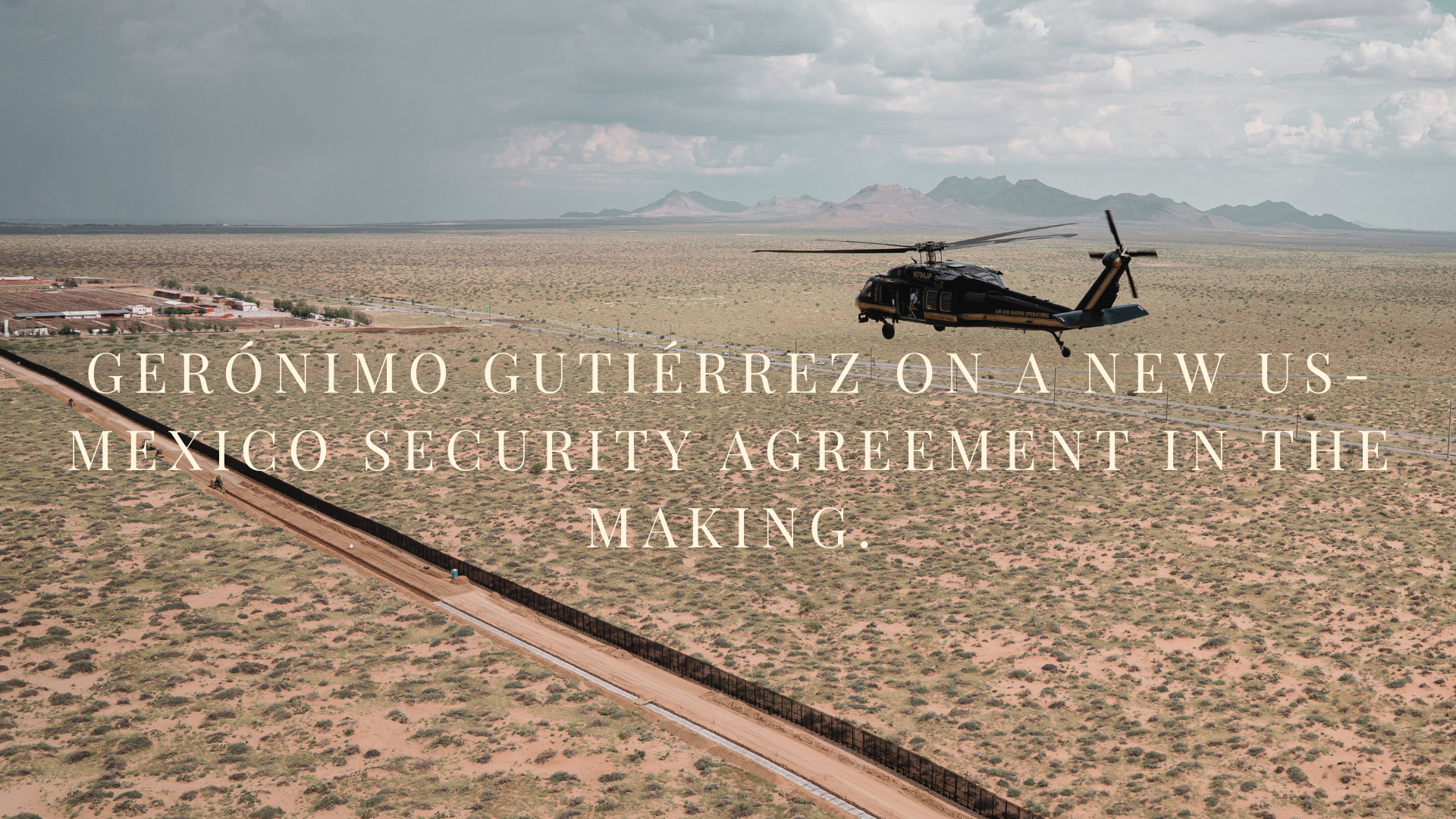
A new US - Mexico security agreement in the making
by Gerónimo Gutiérrez. Ambassador Gutiérrez served as Mexico’s Ambassador to the United States and as Mexico’s Deputy Secretary for Governance and Homeland Security.
—
Last week tensions between the US and Mexico governments surfaced again. President Sheinbaum denied the existence of an agreement between the Drug Enforcement Agency and the Mexican government. Her comments were directed towards a press release from the DEA announcing the launch of a “bold bilateral initiative to dismantle cartel gatekeepers and combat synthetic drug trafficking”. In my view, the rebuttal appears to be more the result of miscommunication than of the lack of willingness on both sides to strengthen cooperation. In fact, Sheinbaum confirmed that some form of security agreement is in the making and could be formalized in the next few weeks during a visit to Mexico of Secretary of State Marco Rubio. This was overlooked and could potentially be good news. Here are four takeaways of last week’s episode…
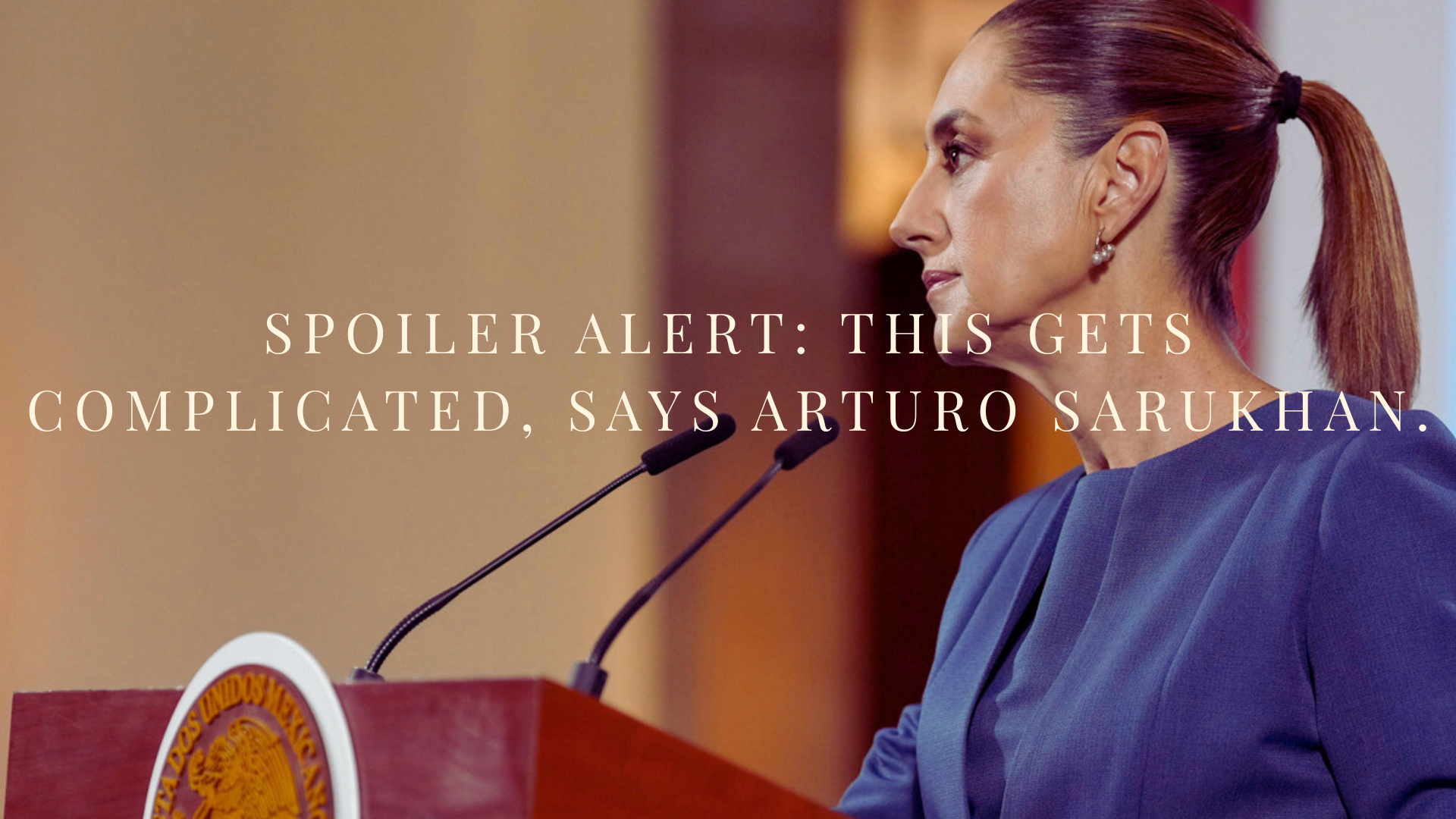
Spoiler alert: this gets complicated
In response to statements emanating from the Mexican presidential bully pulpit that with the United States “we are doing better than any other country,” that “we dialogue with respect and on equal terms,” and that “we coordinate, we collaborate, but we do not subordinate ourselves,”— and also in response to narratives about how Mexico and its president deal with Donald Trump — a steady dose of realism and a reality check - in Mexico’s Congress and across the media, business organizations, and society at large- are urgently required, and we need to carefully weigh where things stand.
While navel gazing in the current juncture of the relationship with the US may feed egos and polls, it’s also dangerous. It can make us short-sighted and cause us to lose sight of the reality looming beyond the horizon. This is especially true since 2018, when Mexico irresponsibly turned its back on the world and on its closest diplomatic and trading partner. But - with Trump having once again kicked the can down the road - Mexico now faces 90 days of uncertainty on tariffs. That’s on top of the looming threat of the unilateral US force against transnational criminal organizations, and a steady stream of pressure points from Washington on a wide-ranging number of issues across our shared bilateral agenda. At no time since her swearing in and — more importantly — during the six months that Sheinbaum’s government has coexisted with the new US administration, has such a national discussion been so urgent in Mexico.
What Mexican governments — both this one and the previous — have failed to grasp is…
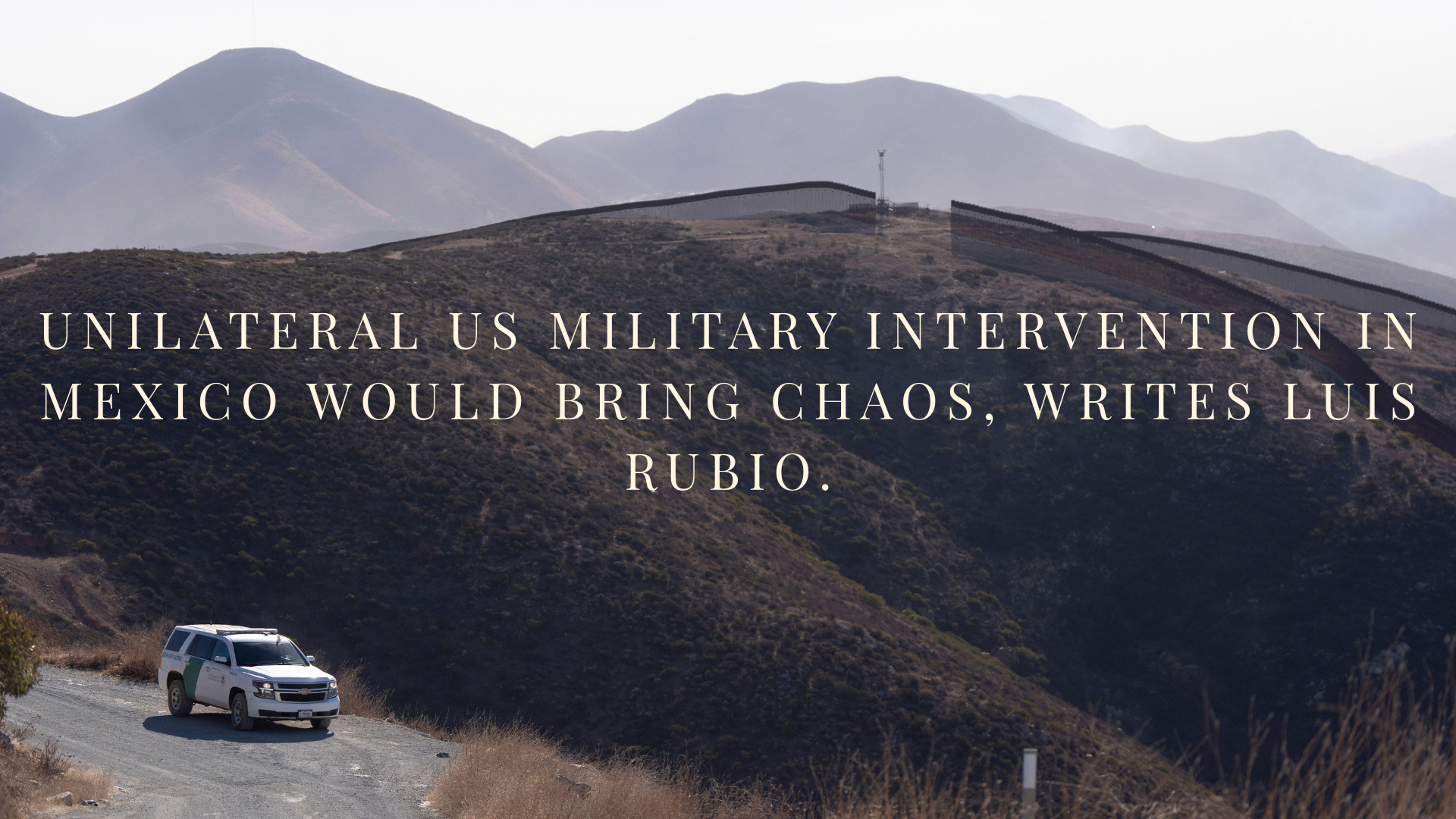
Unilateral US military intervention in Mexico would bring chaos
by Luis Rubio, political analyst and chairman of México Evalúa.
For months, talk has been circulating about a possible US military intervention in Mexico. The idea has gained traction here due to the presence of American intelligence ships in the Gulf of California and, more recently, the sighting of a drone over Valle de Bravo. The issue is also alive in the United States, at least since several Mexican criminal organizations were designated as terrorist groups. In fact, the debate has been simmering for years, as observers there note the growing chaos in certain regions of Mexico and the Mexican government’s seeming inaction. A recent video lays out, quite clearly, the perspective many Americans hold on the matter. No one knows if actual military action might occur — whether directly on the ground or indirectly from the air — but it is a subject that deserves careful analysis.
The video (viewable below) features Joshua Treviño at 35 seconds in. Treviño is a former US Army adviser now with America First, introduced — incorrectly — as a seasoned observer of US–Mexico relations. As I argue below, he has little to no understanding of the situation on the Mexican side…
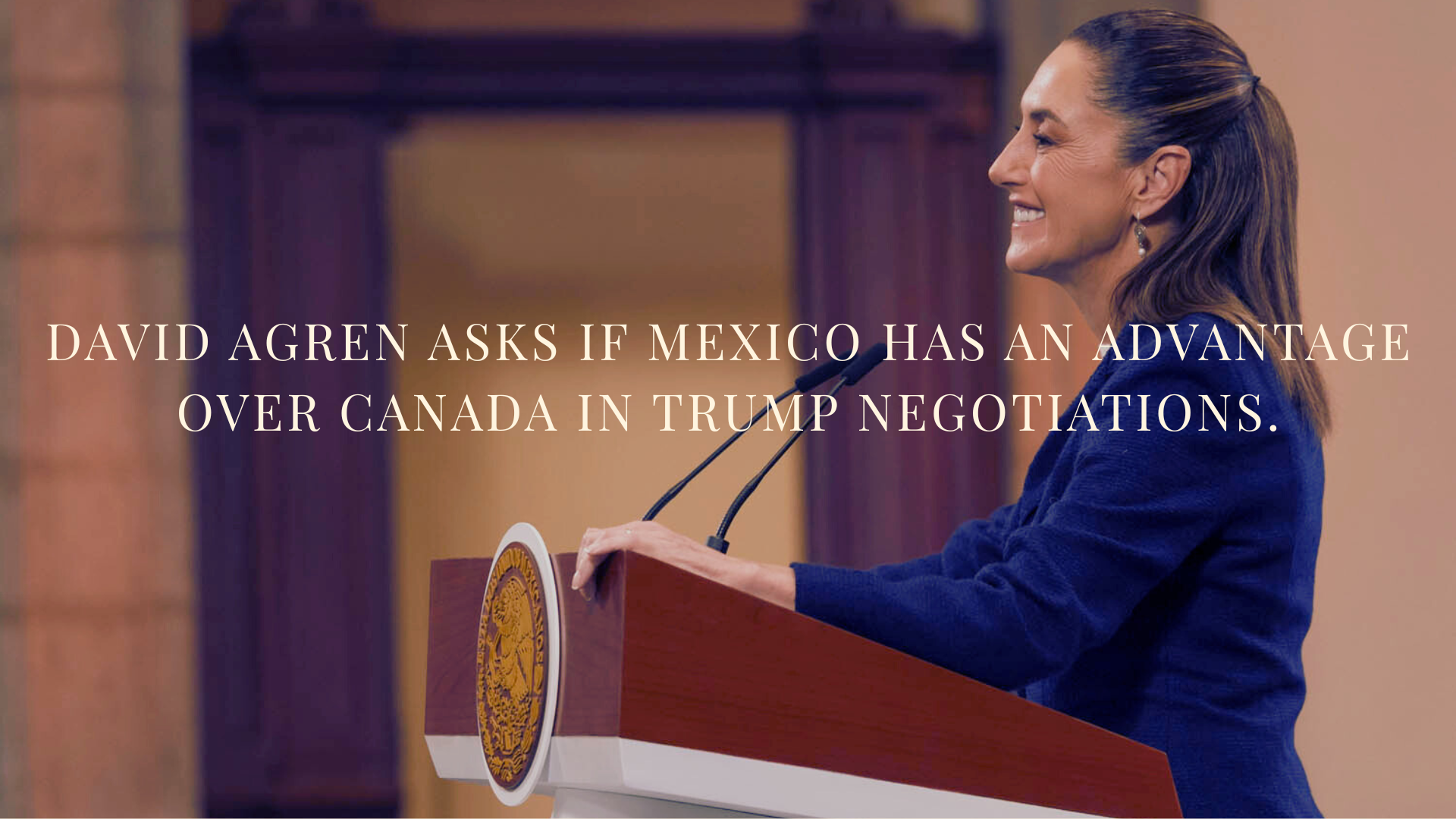
Does Mexico have a bargaining advantage over Canada?
Mexico expelled 26 narco bosses to the United States on Wednesday, responding to the Trump administration to crack down on drug cartels. Among those expelled were Servando Gómez Martínez, “La Tuta,” a former mouthpiece for La Familia Michoacana.
It resembled a similar expulsion of 29 narco bosses – including Rafael Caro Quintero, a man long sought by the Drug Enforcement Administration for the 1985 killing of agent Enrique (Kiki) Camarena.
President Claudia Sheinbaum defended handing over the capos as “sovereign decisions” and stating, “The decision is for our country’s security.”
The expulsions followed revelations in The New York Times that U.S. President Donald Trump quietly signed a directive allowing the use of military force against terror organizations in the Western Hemisphere. Those terror organizations include Mexican drug cartels.
Sheinbaum immediately responded…

Sheinbaum’s monologue diplomacy is meeting Washington’s deaf ear
by David Agren, writer-at-large.
Shortly after rumours started that Ovidio Guzmán – son of imprisoned Sinaloa cartel boss Joaquín “El Chapo” Guzmán – might plead guilty on drug trafficking charges and accept a deal with US prosecutors to turn state’s witness, influencers for Mexico’s ruling party settled on a narrative for denouncing the US government’s actions: It was negotiating with terrorists.
President Claudia Sheinbaum repeated that narrative, too. From the podium of her mañanera press conference, she objected to the deal with the younger Guzmán, while noting the lack of cross-border coordination in the plea bargaining process and reiterating her opposition to the Trump administration’s designation of six drug cartels as foreign terror organizations. "They have a policy of not negotiating with terrorists,” she said. “They decided to designate certain criminal organizations as terrorists. So let them report whether there's an agreement or not."
Sheinbaum’s comments didn’t go unnoticed. Jeffrey Lichtman, Ovidio’s lawyer, plainly stated why the Mexican government wouldn’t be a party to any plea agreement: a lack of trust dating back to 2020 and the decision to send former defence secretary Gen. Salvador Cienfuegos back to Mexico after he was indicted on drug charges in the United States.
The war of words heated up as Sheinbaum, who doesn’t let any slight go unanswered, called Lichtman’s comments “disrespectful” and promised to…

Sheinbaum is facing Trump without a compass
by Luis Rubio.
Editor’s note: Mr. Rubio is a political analyst and Chairman of México Evalúa.
—
Trump sees no need to adhere to the traditional forms and rules of diplomacy. His “mandate” is clear, and he assumes it as absolute truth. If one adds to that his tactical way of acting (with no strategy whatsoever), the result is a bull in a China shop who recognizes no limits to his actions—except what works for him. If one observes how he has handled matters like Russia-Ukraine, China, Iran, Canada, NATO, etc., it becomes evident that he strikes first and then looks for a way to negotiate an exit. Those who have succeeded in dealing with him are the ones who offer a dignified way out, as has happened with NATO, China, and even Iran. That rather obvious lesson has not been learned by Claudia Sheinbaum’s government.
For Trump, there is a specific set of objectives he wants to achieve, which are key to his electoral base. Among those, Mexico plays a central role in two: migration and drugs, especially fentanyl. Biden promoted legislation regarding fentanyl, which Trump is now using to attack financial transactions and institutions allegedly involved in the commercialization, financing, and money laundering related to this drug.
Trump and his operators have a univocal and simplistic (not to mention oversimplified) view of the issues they prioritize. They fervently believe they can solve the fentanyl problem by bombing a few labs, or the migration issue by expelling people who are illegally present in the US. Their actions involve no consideration of causes, market dynamics, or whether the proposed actions are susceptible to solving the problem. Trump believes he has the power and is convinced he can use it to solve these issues—by force if necessary.
If one looks at how he operates, it's fairly obvious how to respond…


